Humour, comics, tech, law, software, reviews, essays, articles and HOWTOs intermingled with random philosophy now and then
Filed under:
Site management by
Hari
Posted on Mon, Mar 9, 2009 at 21:34 IST (last updated: Mon, Mar 9, 2009 @ 21:41 IST)
I'm currently on a drive to salvage some of the better articles I've written on third-party websites and online forums and put them here.
The new section "Articles" is linked in the header. Take a look if you like.
If you do find any more of my articles on other sites which I've probably forgotten about by now, please let me know and I'll put them in the articles section.
Filed under:
Internet and Blogging by
Hari
Posted on Sat, Mar 7, 2009 at 19:41 IST (last updated: Thu, May 7, 2009 @ 18:20 IST)
There's a reason why I'm not seen much online these days. Simply put, I've disappeared from online (
especially tech) forums where I used to spend (in hindsight, I would say "wasted") days, weeks and months, either sharing my knowledge or participating in debates which more or less came around in circles and contributed nothing to the sum total of my own knowledge.
Sharing my knowledge would have been a good enough incentive to continue had there been some kind of official, systematic recognition or reward system. Sadly, most online forums are run by amateur individuals with little or no professional skills (I would include even some of the big forum owners in this category), no managerial resources, no vision; only a bit of free time and money to spend on advertising and promotion.
There is of course, peer approval. But mere peer approval will never be a satisfactory reward for knowledge; if it was, most people in the world would be willing to accept just enough monetary compensation for bare necessities. Of course, there is always an occasional "thank you" message that leaves you feeling good for a while, but that does not (or very rarely) translate into long-term friendship or appreciation.
Helping should never be seen as a waste of time, but unfortunately that is what it has ended up being in online forums because of the general attitudes prevailing in these communities. Even those solutions that you share on public message boards in the hope that it will help others in future end up getting lost in a huge cobweb of irrelevant information and the very same questions will keep popping up over and over again in different places. The impression one gets is that nobody cares.
What is worse about online forums is the tendency, sooner or later, to draw one into flame wars. If you do get caught up in some kind of flame war, all your 1000+ good and helpful messages will be forgotten (if they are remembered at all in the first place) in a flash and you'll be criticized as a troll and have your character analyzed and taken apart; some sarcastic devil will also provide you with unsolicited advise to visit a doctor thrown in amidst his abuse. If there's anything I've learned from online forums, it's that there's no such thing as goodwill; there's no such thing as gratitude. Everything is about cliques and attitudes.
The other important reason I stopped participating is that you lose control over your own content on a web forum and there's no way to keep track of all your contributions in a meaningful manner, while a blog which is fully under your own editorial control and gives you a chance to preserve, categorize, label and highlight your important contributions in a way you think fit. For instance you cannot serve up examples of your online contributions to a prospective employer by showing them messages on a bulletin board. It would just be too tedious. A blog or a personal website on the other hand, gives you the chance to get recognition, readership (small or large) and allows you full freedom to modify, correct or remove out-dated information.
I wish I could get back the time I wasted on these forums. Well, one grows and learns, I suppose.

Filed under:
Site management by
Hari
Posted on Wed, Mar 4, 2009 at 20:45 IST (last updated: Wed, Mar 4, 2009 @ 20:54 IST)
Welcome to my new blog home - harishankar.org. Over the last few days, some major changes have been brewing under the hood as I worked to move over my blog completely to my personal domain and also unify the look and feel of my personal website.
I have set up a 301 permanent redirect to this blog, so that the old blog URL will still work, but I would request you all to update your blogroll and RSS feed readers as soon as it is convenient for you do so (don't forget to update the reviews site RSS feed as well).
I hope you like the new unified look-and-feel of harishankar.org. This has been a long term plan of mine, but I have always been very tentative about it; but now that it is finally done, I actually feel quite relieved that it was so simple. So much so that I cannot help feeling slightly worried that I might have missed something obvious.

All the internal links have been replaced to point to http://harishankar.org/blog/ - so everything should work fine. But this move has really taught me the benefits of using relative URLs for in-site navigation and cross-linking and the great advantage of using the
<base href...> tag.
If you notice anything amiss, please do let me know.
Filed under:
My software by
Hari
Posted on Wed, Feb 25, 2009 at 19:36 IST (last updated: Thu, Feb 26, 2009 @ 10:54 IST)
I've added my project
BiaMovE to google code:
http://code.google.com/p/biamove/
Google code is a lightweight alternate to SourceForge and is really easy to set up a simple project with accompanying Wiki pages. It also supports SVN, though I've not used it in this instance.
Filed under:
Bits and Bytes by
Hari
Posted on Fri, Feb 20, 2009 at 21:52 IST (last updated: Fri, Feb 20, 2009 @ 21:54 IST)
Well, as 3D rendering and modelling can be quite addicting, especially once you start getting the hang of it, I have tried my hand at quite a few different things. Here are some of my efforts using both KPovModeler/PovRay as well as Blender.
First, experimenting with some shininess, transparency and reflections using KPovModeler/PovRay:
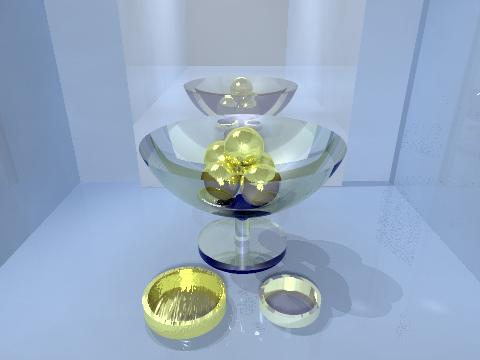
Another glass, modelled using the "Lathe" object of PovRay. The surface is not truly bumpy but created using the "bumps noise" of normals.
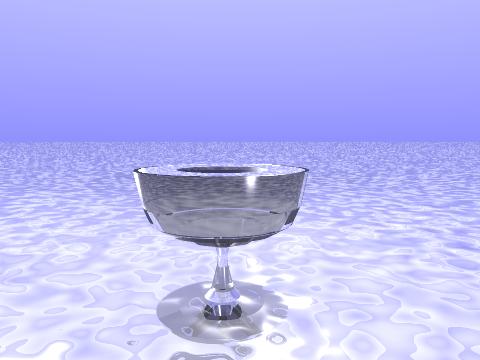
An indoor scene, again modelled in KPovModeler and rendered in PovRay: a room with a glass table with light from both inside and outside (through the window). The objects are very simple, but I did this mainly to test PovRay's rendering of glass reflections and interaction with light.
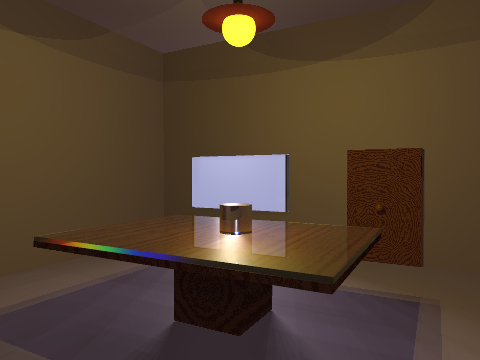
Now, my experiments with Blender: a similar room scene but with shiny wooden stools and no external lighting. The internal light is an area light coming from the ceiling and producing soft shadows. Overall, very happy with this one. The only defect of having no outside lighting is that the window looks like a blackboard. Maybe I should have added more shininess to the glass?
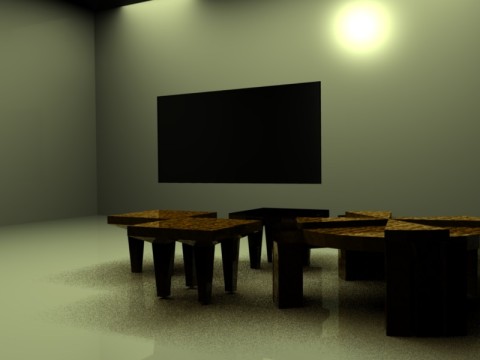
Finally moving on to some real "modelling" of organic shapes. Actually I created this hand out of a cube (yes, and following some of the basic techniques of box modelling and reading one or two tutorials

). The soft skin effect is entirely thanks to Blender's subsurface scattering filter, but not bad for a first attempt eh?

Overall, I find that this can be quite addicting. I know the symptoms when I start looking at real-world objects and wonder about their reflectivity and specularity.


Filed under:
Software and Technology by
Hari
Posted on Sat, Feb 14, 2009 at 10:23 IST (last updated: Thu, May 7, 2009 @ 21:11 IST)
KPovModeler is an extremely easy to use front-end for
PovRay for KDE. It is far more easy to use and understand than Blender and further, you can use the innate power of PovRay to create some quite dazzling lighting effects on 3D objects.
Being a casual fan of 3D modelling myself, I find that PovRay concepts are far easier to understand than other similar 3D rendering tools available and it fits the needs of an amateur 3D artist quite well. Also the easy to use tree-like object hierarchy makes building objects as simple as drag and drop.
Here's a (simple) 3D image I created within a few minutes using the basic primitives and constructive solid geometry. Obviously there's a lot more to PovRay than what I could come up with.
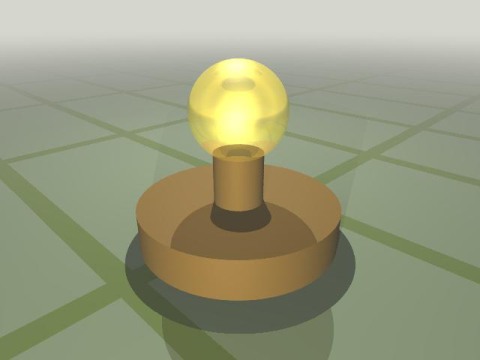
Pages:
1
...
67
68
69
70
71
72
73
74
75
...
140

 All the internal links have been replaced to point to http://harishankar.org/blog/ - so everything should work fine. But this move has really taught me the benefits of using relative URLs for in-site navigation and cross-linking and the great advantage of using the
All the internal links have been replaced to point to http://harishankar.org/blog/ - so everything should work fine. But this move has really taught me the benefits of using relative URLs for in-site navigation and cross-linking and the great advantage of using the  Another glass, modelled using the "Lathe" object of PovRay. The surface is not truly bumpy but created using the "bumps noise" of normals.
Another glass, modelled using the "Lathe" object of PovRay. The surface is not truly bumpy but created using the "bumps noise" of normals. An indoor scene, again modelled in KPovModeler and rendered in PovRay: a room with a glass table with light from both inside and outside (through the window). The objects are very simple, but I did this mainly to test PovRay's rendering of glass reflections and interaction with light.
An indoor scene, again modelled in KPovModeler and rendered in PovRay: a room with a glass table with light from both inside and outside (through the window). The objects are very simple, but I did this mainly to test PovRay's rendering of glass reflections and interaction with light. Now, my experiments with Blender: a similar room scene but with shiny wooden stools and no external lighting. The internal light is an area light coming from the ceiling and producing soft shadows. Overall, very happy with this one. The only defect of having no outside lighting is that the window looks like a blackboard. Maybe I should have added more shininess to the glass?
Now, my experiments with Blender: a similar room scene but with shiny wooden stools and no external lighting. The internal light is an area light coming from the ceiling and producing soft shadows. Overall, very happy with this one. The only defect of having no outside lighting is that the window looks like a blackboard. Maybe I should have added more shininess to the glass? Finally moving on to some real "modelling" of organic shapes. Actually I created this hand out of a cube (yes, and following some of the basic techniques of box modelling and reading one or two tutorials
Finally moving on to some real "modelling" of organic shapes. Actually I created this hand out of a cube (yes, and following some of the basic techniques of box modelling and reading one or two tutorials  ). The soft skin effect is entirely thanks to Blender's subsurface scattering filter, but not bad for a first attempt eh?
). The soft skin effect is entirely thanks to Blender's subsurface scattering filter, but not bad for a first attempt eh? Overall, I find that this can be quite addicting. I know the symptoms when I start looking at real-world objects and wonder about their reflectivity and specularity.
Overall, I find that this can be quite addicting. I know the symptoms when I start looking at real-world objects and wonder about their reflectivity and specularity. 

